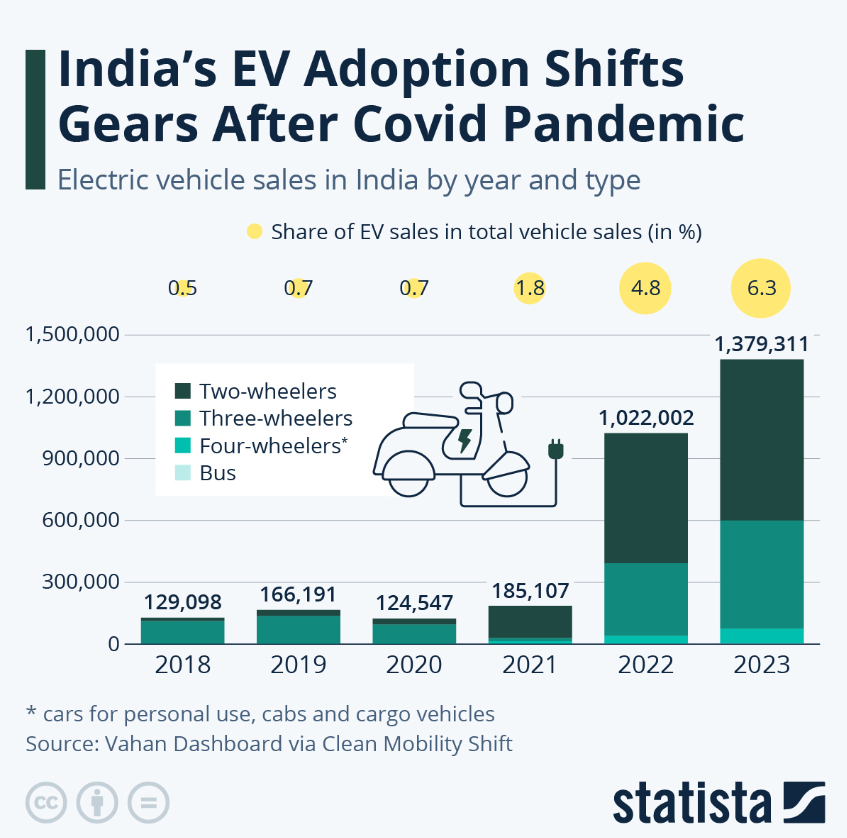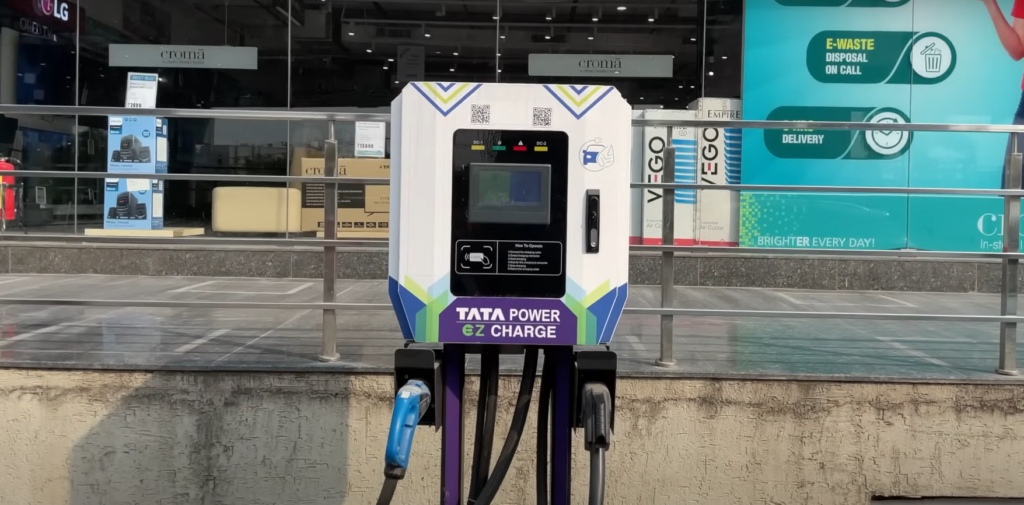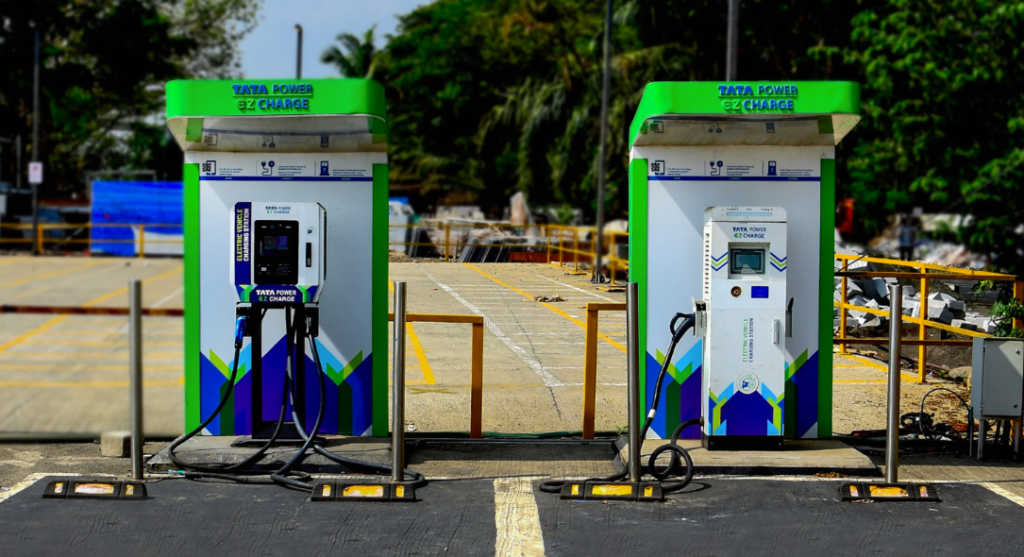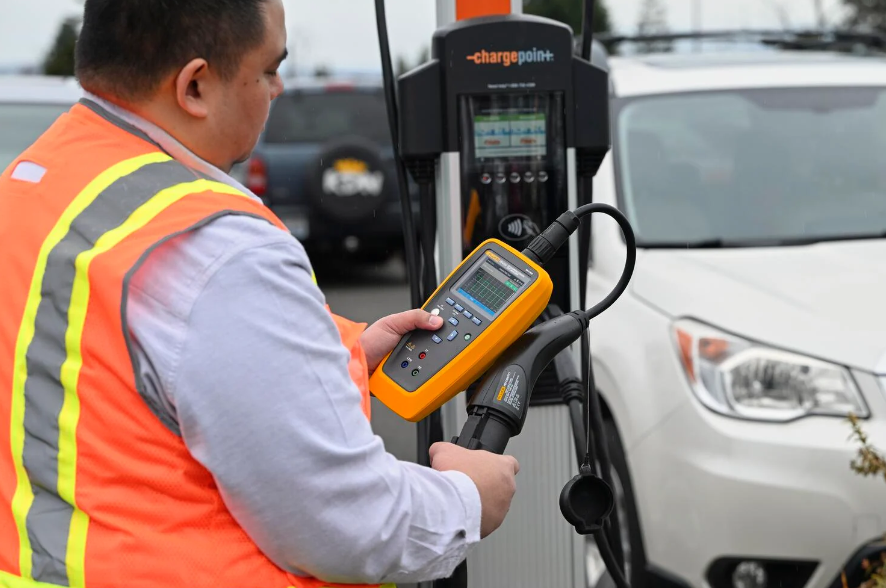Introduction

As pollution is increasing, diesel and petrol vehicles are being allowed to be banned and EV charging stations are being promoted If the number of electric vehicles increases, There is going to be a lot of demand for electric vehicles in the coming times Given pollution, the government is banning diesel and petrol vehicles and promoting EV As you can see, all the companies are focusing on making EV cars As the demand for EV cars increases daily, the demand for EV charging stations will also increase keeping this time in mind At this time anyone can set up a good business by opening an EV charging station. As per the source from statista EV trends are increasing rapidly.

- Introduction
- 1.Market Research and Location
- 2. Licensing and Legal Requirements
- 3. Types of EV Chargers
- 4. Charging Standards for EVs in India
- 5. Cost Estimation and Funding Options
- 6. Government Incentives and Subsidies
- 7. Partnering with EV Manufacturers
- 8. Technology and Software Integration
- 9. Marketing and branding
- 10. Maintenance & Customer Support
- 11. Conclusion
1.Market Research and Location
Investigate the local market before opening an EV charging station. Many individuals desire to purchase electric cars these days, therefore your target market may include EV-owning corporations or normal consumers. Examine the offerings of other nearby charging stations to identify any shortcomings. Discover the government’s cost-assistance programs offering financial aid or tax breaks. Lastly, familiarise yourself with the various charger kinds and select the most appropriate ones for your station.
Find a location close to busy roads or malls that has plenty of parking and an abundant supply of electricity. Easy access to eateries or retail establishments aids in passing the time while charging. To meet future demand, make sure the area’s usage of electric vehicles is increasing.

2. Licensing and Legal Requirements
It’s necessary to take on all legal requirements ahead of launching any firm. Getting the required licenses and permits from the local governments is part of this. Depending on the type of business, you might need land permits, safety certifications, and environmental approvals, for for example. To avoid the penalties or delays, always make sure you are aware of the exact laws that apply in your area.
3. Types of EV Chargers
- Level 1 Charger: Slow charging, usually for home use.
- Level 2 Charger: Faster charging, common at public stations and homes.
- DC Fast Charger: Very fast, typically found at commercial stations for quick top-ups.
- Ultra-Fast Charger: The fastest type, suitable for long-distance travel

4. Charging Standards for EVs in India
To make sure electric cars (EVs) can be charged quickly, India established special charging requirements for them. The primary varieties include the Bharat Standard (Bharat DC 001 and AC 001), which are suitable with all EV types, and other fast charging choices including CHAdeMO and CCS. These guidelines make it simpler for consumers to use electric vehicles and locate charging stations around the our country.
5. Cost Estimation and Funding Options
Starting an electric charging station can cost anywhere from ₹15 to 40 lakhs. Depending on the equipment and location, The primary expenses involve purchasing the chargers, installing electrical hookups, and maybe purchasing or leasing land. You might look into bank loans, government programs, or joint ventures with electric vehicle manufacturers for funding. Incentives for supporting EV charging stations are also provided by several governments, which can assist bring down the overall cost.

6. Government Incentives and Subsidies
The government provides money or tax breaks to facilitate the construction of an electric charging station We refer to these as subsidies and incentives. They can make setting up your charging station less expensive. In addition, some municipal governments can provide land at a reduced cost or assist with construction. Assess the resources in your community to cut expenses and facilitate the launch of your EV charging station.
7. Partnering with EV Manufacturers
Partnering with electric vehicle (EV) producers can benefit your firm that sells charging stations. They may help in promoting your station and provide equipment discounts. You may make sure that a variety of EVs can use your station by collaborating with them. This will update you on new EV technology and attract more customers. Forming partnerships with manufacturers can help your company expand and contribute to the general growth of electric vehicles.

8. Technology and Software Integration
Advanced chargers that work with different electric vehicles and intelligent software to oversee operations are required to launch an electric charging station. Along with setting rates, the software facilitates real-time adjustments and energy use tracking. Moreover, clients can use smartphone apps to locate station reserve times, and pay. Efficient management and a smooth user experience are guaranteed by this technological integration.

9. Marketing and branding
Choose branding and marketing while launching an EV charging station. Pick a memorable name and create a simple logo that demonstrates your dedication to renewable energy. Share details about your EV charging station, such as its location and possibilities for fast charging, on social media. Partner with nearby enterprises or manufacturers of electric cars to advertise your station. Offer loyal consumers exclusive discounts or benefits. To make it simple for clients to locate and utilize your EV charging station, make sure you have well-lit signage and an intuitive app.
10. Maintenance & Customer Support
Developing a dependable maintenance and customer support system is necessary before launching an electric charging station. To ensure prompt issue resolution, start by training your team on how to operate and troubleshoot charging equipment. Include a customer service phone number or application so that people can report issues or ask inquiries. It is imperative to plan routine maintenance checks for all charging units to ensure optimal operation. To improve user pleasure and knowledge, the charging stations should also have visible signs and instructions.

11. Conclusion
Installing an EV charging station is a profitable business venture that caters to the increasing need for electric vehicles as well as CNG PUMP stations which also reduces pollution. It is possible to generate revenue and contribute to a more sustainable future with careful planning, effective location, and profitable marketing.










